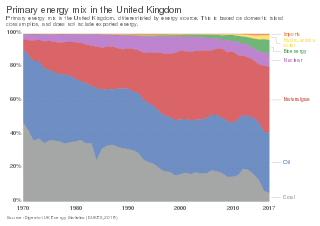Related Research Articles

Biofuel is a fuel that is produced over a short time span from biomass, rather than by the very slow natural processes involved in the formation of fossil fuels, such as oil. Since biomass can be used as a fuel directly, some people use the words biomass and biofuel interchangeably. However, the word biofuel is usually reserved for liquid or gaseous fuels used for transportation. The U.S. Energy Information Administration (EIA) follows this naming practice.
The United Kingdom's Climate Change Programme was launched in November 2000 by the British government in response to its commitment agreed at the 1992 United Nations Conference on Environment and Development (UNCED). The 2000 programme was updated in March 2006 following a review launched in September 2004.

Energy is sustainable if it "meets the needs of the present without compromising the ability of future generations to meet their own needs". Most definitions of sustainable energy include considerations of environmental aspects such as greenhouse gas emissions and social and economic aspects such as energy poverty. Renewable energy sources such as wind, hydroelectric power, solar, and geothermal energy are generally far more sustainable than fossil fuel sources. However, some renewable energy projects, such as the clearing of forests to produce biofuels, can cause severe environmental damage. The role of non-renewable energy sources in sustainable energy has been controversial. Nuclear power is a low-carbon source whose historic mortality rates are comparable to wind and solar, but its sustainability has been debated because of concerns about radioactive waste, nuclear proliferation, and accidents. Switching from coal to natural gas has environmental benefits, including a lower climate impact, but may lead to a delay in switching to more sustainable options. Carbon capture and storage can be built into power plants to remove their carbon dioxide emissions, but is expensive and has seldom been implemented.
Ed Gallagher is a British scientist. He was a council member of English Nature and chair of the Pesticides Forum which is part of Department for Environment, Food and Rural Affairs (DEFRA). He is a Freeman of the City of London.

The energy policy of the United Kingdom refers to the United Kingdom's efforts towards reducing energy intensity, reducing energy poverty, and maintaining energy supply reliability. The United Kingdom has had success in this, though energy intensity remains high. There is an ambitious goal to reduce carbon dioxide emissions in future years, but it is unclear whether the programmes in place are sufficient to achieve this objective. Regarding energy self-sufficiency, United Kingdom policy does not address this issue, other than to concede historic energy self sufficiency is currently ceasing to exist.

The Climate Change and Sustainable Energy Act 2006 is an Act of the Parliament of the United Kingdom which aims to boost the number of heat and electricity microgeneration installations in the United Kingdom, so helping to cut carbon emissions and reduce fuel poverty.

The Renewable Transport Fuel Obligation (RTFO) in the United Kingdom is a requirement on transport fuel suppliers to ensure that 5 per cent of all road vehicle fuel is supplied from sustainable renewable sources by 2010. The Government intends to set variable targets for the level of carbon and sustainability performance expected from all transport fuel suppliers claiming certificates for biofuels in the early years of the RTFO.

Directive 2003/30/EC was a European Union directive for promoting the use of biofuels for EU transport. The directive entered into force in May 2003, and stipulated that national measures must be taken by countries across the EU aiming at replacing 5.75% of all transport fossil fuels with biofuels by 2010. The directive also called for an intermediate target of 2% by 31 December 2005. The target of 5.75% was to be met by 31 December 2010. These percentages were to be calculated on the basis of energy content of the fuel and were to apply to petrol and diesel fuel for transport purposes placed on the markets of member states. Member states were encouraged to take on national "indicative" targets in conformity with the overall target.
Biofuel is fuel that is produced from organic matter (biomass), including plant materials and animal waste. It is considered a renewable source of energy that can assist in reducing carbon emissions. The two main types of biofuel currently being produced in Australia are biodiesel and bioethanol, used as replacements for diesel and petrol (gasoline) respectively. As of 2017 Australia is a relatively small producer of biofuels, accounting for 0.2% of world bioethanol production and 0.1% of world biodiesel production.

Although the European Union has legislated, set targets, and negotiated internationally in the area of energy policy for many years, and evolved out of the European Coal and Steel Community, the concept of introducing a mandatory common European Union energy policy was only approved at the meeting of the European Council on October 27, 2005 in London. Following this the first policy proposals, Energy for a Changing World, were published by the European Commission, on January 10, 2007. The most well known energy policy objectives in the EU are 20/20/20 objectives, binding for all EU Member States. The EU is planning to increase the share of renewable energy in its final energy use to 20%, reduce greenhouse gases by 20% and increase energy efficiency by 20%.

A low-carbon economy (LCE) or decarbonised economy is an economy based on energy sources that produce low levels of greenhouse gas (GHG) emissions. GHG emissions due to human activity are the dominant cause of observed climate change since the mid-20th century. Continued emission of greenhouse gases will cause long-lasting changes around the world, increasing the likelihood of severe, pervasive, and irreversible effects for people and ecosystems. Shifting to a low-carbon economy on a global scale could bring substantial benefits both for developed and developing countries. Many countries around the world are designing and implementing low-emission development strategies (LEDS). These strategies seek to achieve social, economic, and environmental development goals while reducing long-term greenhouse gas emissions and increasing resilience to the effects of climate change.

Sustainable biofuel is biofuel produced in a sustainable manner. It is not based on petroleum or other fossil fuels. It includes not using plants that are used for food stuff to produce the fuel thus disrupting the worlds food supply.
The Renewable Fuel Standard(RFS) is an American federal program that requires transportation fuel sold in the United States to contain a minimum volume of renewable fuels. It originated with the Energy Policy Act of 2005 and was expanded and extended by the Energy Independence and Security Act of 2007. Research published by the Government Accountability Office in November 2016 found the program unlikely to meet its goal of reducing greenhouse gas emissions due to limited current and expected future production of advanced biofuels.
The environmental impact of biodiesel is diverse and not clearcut. An often mentioned incentive for using biodiesel is its capacity to lower greenhouse gas emissions compared to those of fossil fuels. Whether this is true or not depends on many factors.
There are various social, economic, environmental and technical issues with biofuel production and use, which have been discussed in the popular media and scientific journals. These include: the effect of moderating oil prices, the "food vs fuel" debate, poverty reduction potential, carbon emissions levels, sustainable biofuel production, deforestation and soil erosion, loss of biodiversity, effect on water resources, the possible modifications necessary to run the engine on biofuel, as well as energy balance and efficiency. The International Resource Panel, which provides independent scientific assessments and expert advice on a variety of resource-related themes, assessed the issues relating to biofuel use in its first report Towards sustainable production and use of resources: Assessing Biofuels. In it, it outlined the wider and interrelated factors that need to be considered when deciding on the relative merits of pursuing one biofuel over another. It concluded that not all biofuels perform equally in terms of their effect on climate, energy security and ecosystems, and suggested that environmental and social effects need to be assessed throughout the entire life-cycle.
Carbon-based fuel is any fuel principally from the oxidation or burning of carbon. Carbon-based fuels are of two main kinds, biofuels and fossil fuels. Whereas biofuels are derived from recent-growth organic matter and are typically harvested, as with logging of forests and cutting of corn, fossil fuels are of prehistoric origin and are extracted from the ground, the principal fossil fuels being oil, coal, and natural gas.
Strict sustainability standards for biofuel in the European Union (EU) are set by the European Commissioner on Energy. Biofuels are considered a renewable alternative to fossil fuels in the transportation sector for the EU. The EU has played a large role in increasing the use of biofuels in member states; however, it has also aimed, to some extent, to mitigate the potential negative impacts of biofuel production. Current EU legislation on biofuels includes a goal to increase renewable energy consumption by 20%, eliminate biofuel feedstock sourced from carbon-rich land, accounting for emissions caused from land use change as well as solely biofuel usage, and reducing greenhouse gas intensities from fuels used in transport and machinery.

A low-carbon fuel standard (LCFS) is an emissions trading rule designed to reduce the average carbon intensity of transportation fuels in a given jurisdiction, as compared to conventional petroleum fuels, such as gasoline and diesel. The most common methods for reducing transportation carbon emissions are supplying electricity to electric vehicles, supplying hydrogen fuel to fuel cell vehicles and blending biofuels, such as ethanol, biodiesel, renewable diesel, and renewable natural gas into fossil fuels. The main purpose of a low-carbon fuel standard is to decrease carbon dioxide emissions associated with vehicles powered by various types of internal combustion engines while also considering the entire life cycle, in order to reduce the carbon footprint of transportation.

The indirect land use change impacts of biofuels, also known as ILUC or iLUC, relates to the unintended consequence of releasing more carbon emissions due to land-use changes around the world induced by the expansion of croplands for ethanol or biodiesel production in response to the increased global demand for biofuels.
Michael Wang is a distinguished fellow, a senior scientist, and director of the Systems Assessment Center of the Energy Systems Division at the U.S. Department of Energy’s (DOE) Argonne National Laboratory. He is also a faculty associate in the Energy Policy Institute at The University of Chicago; a senior fellow at the Northwestern-Argonne Institute of Science and Engineering at Northwestern University.
References
- ↑ "The RFA closes on 31/03/11. This website will not be updated after this date. Information on the RTFO published from 01/04/11 will be found on the Department for Transport’s website at http://dft.gov.uk/pgr/sustainable/biofuels/ "
- ↑ About the RFA The Renewable Fuels Agency
- ↑ Carbon and Sustainability Reporting Within the Renewable Transport Fuel Obligation Archived 25 March 2009 at the Wayback Machine The Department for Transport
- ↑ RTFO reports RTFO reports published by the RFA
- ↑ Year One of the RTFO First Annual Report on the wider impacts of the RTFO
- ↑ Gallagher Review
- ↑ Energy Act 2004 Office of Public Sector Information
- ↑ Renewable Transport Fuel Obligation Order Office of Public Sector Information
- ↑ "A letter from the chairman of the RFA, Professor ed Gallagher on the abolition of the Agency | the Renewable Fuels Agency". Archived from the original on 11 November 2010. Retrieved 20 January 2011.